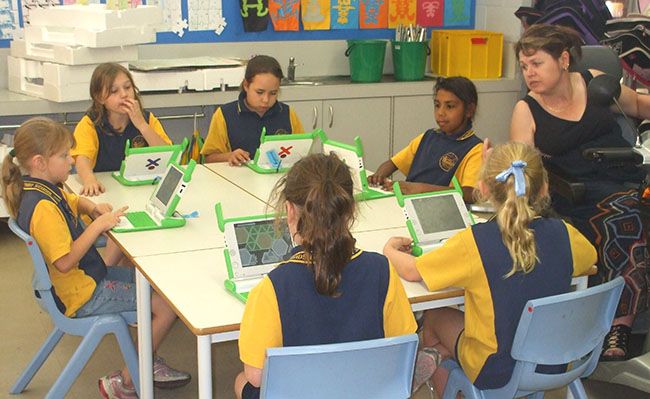A 'happy, safe and well-supported' tribe
21 October 2011
 By KIERAN FINNANE
By KIERAN FINNANE
It’s been a big week for Bradshaw Primary School: on top of teacher-librarian Jo Sherrin’s national gong (see separate story), the school was a winner in the 2011 Northern Territory Smart Schools Awards for “Excellence in Student Inclusion and Wellbeing”.
The fact that the school applied for that category in the awards reflects its values: the first thing that principal Jill Tudor mentions is keeping children happy, safe and well-supported so that teaching and learning are the best they can be.
Then there are the school’s few guiding ‘e’ words:
• equity – children get what they need, rather than everyone getting the same;
• expectations – they’re high as with the right support every child can learn;
• effort – the harder you work, the smarter you get.
It’s Mrs Tudor’s third year at the helm at Bradshaw, but she credits former principal Ursula Balfour for putting in the “hard yards” to develop the inclusive culture that is the now hallmark of the school.
It has paid off: behind the smiling faces, and in the hands of “an incredibly strong team” are busy little minds learning well. Bradshaw keeps “rigorous, systematic” data to make its case and comparisons with like schools on the MySchool website shows it to be substantially ahead in most categories in the national literacy and numeracy assessments (NAPLAN).
How does the school transmit its values?
In multiple ways: every person counts and is made to feel welcome and respected. It starts with the bilingual (English and Arrernte) welcome sign at the front entrance, followed by the “director of first impressions” – Virginia Moore at the front desk. The whole school is a “tribe” (Tribes is the name of an educational philosophy developed by Jeanne Gibbs in USA), all working together towards the same end goal. That means the janitor, Cliff Alder, is involved in student learning alongside the teachers.
There’s a buddy system: every senior class is matched with a junior class and at whole school events big and little buddies do things with one another.
The school connects with the community – “real life learning”, as Mrs Tudor describes it. There was strong participation by Bradshaw students at this year’s Eisteddfod and the Wearable Arts Awards. Parents are welcome to take part in school life and that includes, of course, Aboriginal families, whose children make up more than half of the school population.
Social skills are taught explicitly: aspects of how we relate to one another are nominated each week for exploration in every class. This week, for example, students and teachers were talking about “tact”.
“This gives children a language so that they can think about their interactions,” explains Mrs Tudor.
Again, the school knows that this approach is paying off. A record is kept of children’s visits to the “Solutions Room”, where they work out their differences and “put things right”, with a teacher mediating if necessary. The data shows that the incidence of things like hitting is decreasing. Last year there may have been an instance of hitting every two days – already relatively minor for a school population of 390. This year that has been halved, says Mrs Tudor.
A visit to the Solutions Room is not seen as a punishment. Rather, “it’s a way of supporting them to learn from their mistakes” and sometimes children go there voluntarily.
Bradshaw School has been acknowledged this week, but it’s not alone in its striving, says Mrs Tudor: “There are many outstanding people in the Northern Territory, and it’s perhaps because we are isolated, that people make the extra effort.”
In fact, in the national awards where Mrs Sherrin won in the primary teacher category, there were three other NT finalists. Karen Blanchfield from Ross Park Primary in Alice Springs was a finalist in “Primary Principal of the Year”. In the Top End Tim Webb from Belyuen School was a finalist for the Minister’s Award for “Excellence in Teaching or Leadership in Aboriginal and Torres Strait Islander Education” and Judith O’Hearn from Palmerston Senior College was a finalist in “Secondary Teacher of the Year”.
Pictured: “Happy, safe, well-supported children” at work: Karen Stewart watches her students using their “One Laptop Per Child” computers to practice their spelling. Photo courtesy Bradshaw Primary School.


